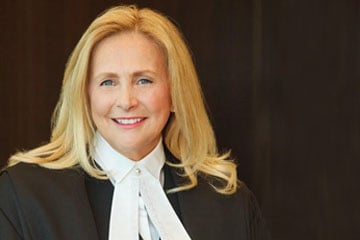Prime Minister Justin Trudeau announced today that Sheilah L. Martin will fill the vacancy left when Chief Justice Beverley McLachlin retires on Dec. 15.

Prime Minister Justin Trudeau announced today that Sheilah L. Martin will be the new justice on the Supreme Court of Canada.
“I am confident that, with the wealth of experience she has gained over a distinguished thirty‑year career, she will be a valuable addition to the Supreme Court, an institution well respected in Canada and around the world for its strength, independence, and judicial excellence,” Trudeau said in a media release Wednesday morning.
The nomination, which comes from a shortlist of three to five candidates Trudeau received last month by an independent advisory board that fielded all applications for the spot, maintains the gender balance of the court, which remains four women and five men.
“The selection process sought jurists of the highest caliber, who were functionally bilingual and representative of the diversity of this great country,” according to the news release.
Martin is the second Supreme Court judge to hail from Alberta, joining Justice Russell Brown who was appointed by former Prime Minister Stephen Harper.
Martin comes from the Courts of Appeal of Alberta, the Northwest Territories and Nunavut where she was elevated from the Alberta Court of the Queen’s Bench in Calgary in June of 2016 to replace former justice Clifton O’Brien, who retired in 2014. She has served as a deputy judge for the Supreme Court of Yukon since 2009. Martin practised as a barrister and solicitor and partner at Code Hunter LLP, a civil and constitutional law litigation firm in Calgary, before joining the bench in 2005.
Martin also worked as a researcher and law professor at the University of Calgary from 1982 to 1986, returning to work in the school’s Faculty of Law from 1991 to 1996 as acting dean and then dean. She taught courses ranging from commercial transactions and feminist legal theory to advanced constitutional law.
The University of Calgary’s current dean, Ian Holloway, praised his predecessor as a jurist and an individual following the announcement of her appointment.
“When I arrived here [in 2011], she was among the first to welcome me and helped to introduce me to the legal community here in Calgary,” says Holloway.
Justice Martin was then sitting on Alberta’s Court of Queen’s Bench.
“I’ve come to know her quite well,” Holloway says. “She’s an outstanding choice for the Supreme Court of Canada. She’s extremely smart, very hardworking, warm and personable and empathetic. She’s got the legal knowledge, but she’s also got those other human qualities that really are the hallmark of an outstanding jurist.
“She really is an extraordinary person,” he notes, adding that “she’s held in professionally high regard across the country.”
Some were hoping an indigenous person would fill the seat, and the hashtag #Diversityadjacent appeared on Twitter shortly after Martin was announced as the new SCC judge, suggesting other candidates should have been considered.
Eugene Meehan, former executive legal officer at the Supreme Court and lawyer at Supreme Advocacy LLP in Ottawa told Legal Feeds via email, "The dilemma of whether Canada appoints the best judge, the best ‘bilingualist’, the best this, the best that, appears to be continuing. The person that’s the best in every single department, like the Holy Grail, has not yet been found."
The press release outlined Martin’s 33-year career, noting that “she has maintained a strong focus on education, equality rights and increasing the number of under-represented groups in law schools and the legal profession, including Indigenous Peoples.”
She has received numerous awards including the Distinguished Service Award for Legal Scholarship, the Law Society of Alberta’s Certificate of Merit and the YWCA’s Advancement of Women Award.
Martin was born and grew up in Montreal, and she trained in civil and common law at McGill University before moving to Alberta to begin her career as educator, lawyer and judge, according to her biography page. She attended the University of Alberta where she received a Master of Laws and then completed a Doctorate of Juridical Science from the University of Toronto. She was called to the Alberta Bar in 1989.
In her candidate questionnaire, Martin listed work on the Indian Residential Schools Settlement, analyzing compensation for the wrongfully convicted, judicial training on social context and equality education and her time as a trial judge on cases involving physician-assisted death as some of her most challenging and significant cases or matters she’s dealt with in her career.
“Judges have significant responsibilities to the public and I have come to appreciate that my ability to act or speak with any authority came from doing the work: educating myself, time and again, about the dispute I was called upon to resolve,” Martin wrote in her application. “Integrity is also in the details.”
Next steps include a special meeting of the House of Commons Standing Committee on Justice and Human rights on Dec. 4, where Justice Minister Jody Wilson-Raybould and a representative from the Independent Advisory Board for Supreme Court of Canada Judicial Appointments will give more details on the choice. This is in keeping with the government’s commitment to openness and transparency in the judicial appointment process. Then, on Dec. 5, there will be a question-and-answer period with Martin at the University of Ottawa.
— with files from Elizabeth Raymer
Updated Nov. 29, 2017 at 3:43 p.m. with comments from Eugene Meehan.










